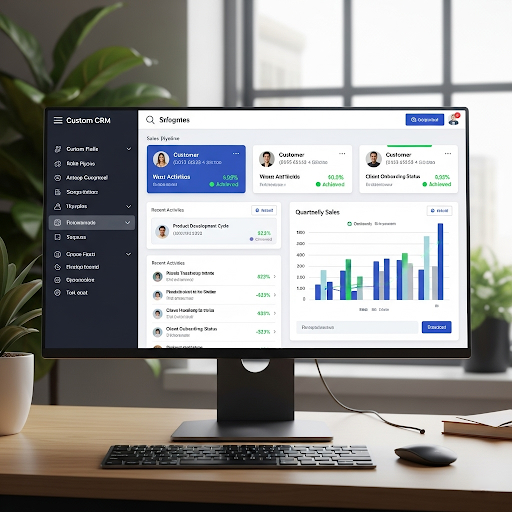In today’s competitive business landscape, managing customer relationships efficiently is no longer optional—it’s essential. Standard off-the-shelf CRM systems may offer generic solutions, but they often fail to address the unique workflows, data structures, and goals of individual businesses. This is where custom CRM software comes into play. Designed specifically for your organization, custom CRM solutions empower teams, improve customer satisfaction, and drive overall growth.
Whether you are a small business looking to scale or a large enterprise seeking seamless integration across departments, custom CRM software provides the flexibility, control, and insights needed to stay ahead.
What is Custom CRM Software?
A custom CRM (Customer Relationship Management) system is a software solution designed specifically to meet the unique requirements of a business. Unlike off-the-shelf CRMs, which offer fixed features, a custom CRM can be tailored to support your specific sales processes, customer engagement strategies, and internal workflows.
Key characteristics include:
-
Personalized dashboards and analytics
-
Custom automation for sales and marketing
-
Integration with existing tools and platforms
-
Scalable architecture for business growth
Real-life example: A mid-sized real estate firm needed a CRM that could manage multiple property listings, client interactions, and lead sources simultaneously. Streamlinerei developed a custom CRM that allowed agents to track leads, schedule follow-ups, and generate performance reports in real-time, resulting in a 35% increase in lead conversion rates.
Benefits of Custom CRM Software
Investing in a custom CRM solution provides multiple advantages that off-the-shelf solutions simply cannot match.
1. Tailored to Your Business Needs
Every business operates differently. A custom CRM allows you to define workflows, automate specific tasks, and ensure your CRM aligns with your sales, marketing, and customer service processes.
Example: A logistics company integrated shipment tracking and customer notifications directly into their CRM, reducing response times and improving client satisfaction.
2. Scalability and Flexibility
As your business grows, so do your CRM requirements. Custom CRMs are built with scalability in mind, allowing you to add modules, features, and integrations without overhauling the entire system.
3. Enhanced Data Security
With a custom CRM, your business controls data access, storage, and privacy. Sensitive customer information remains secure, reducing the risk of data breaches compared to generic CRM platforms.
4. Improved User Adoption
Since custom CRM software is designed specifically for your team, it’s more intuitive and easier to adopt. Tailored interfaces and relevant features mean employees spend less time learning and more time engaging with customers.
5. Better Analytics and Reporting
Custom CRMs can track key performance metrics unique to your business, helping management make informed decisions. From sales trends to customer behavior analysis, actionable insights are readily available.
Core Features of Custom CRM Software
A well-designed custom CRM includes essential features that boost efficiency and productivity.
Lead Management
Track leads from multiple sources, assign them to sales agents automatically, and monitor progress until conversion.
Sales Automation
Automate repetitive sales tasks such as follow-up emails, lead scoring, and appointment scheduling.
Customer Interaction Tracking
Record calls, emails, and meetings to maintain a complete history of customer interactions.
Analytics and Reporting
Generate customizable reports to evaluate sales performance, marketing campaigns, and customer engagement.
Integration Capabilities
Seamlessly connect with email platforms, social media, ERP systems, and other tools critical for your business operations.
How Custom CRM Software Streamlines Business Operations
A custom CRM improves efficiency in multiple departments by consolidating workflows into a single platform.
-
Sales Teams: Focus on closing deals rather than managing administrative tasks.
-
Marketing Teams: Execute targeted campaigns based on real-time customer data.
-
Customer Support Teams: Access complete customer history to provide personalized support.
-
Management: Monitor KPIs and team performance through intuitive dashboards.
Example: A digital marketing agency integrated client campaign performance and billing into their CRM, reducing reporting time from 10 hours per week to 2 hours.
Choosing the Right Custom CRM Developer
Selecting the right developer or agency is crucial for a successful CRM implementation. Key considerations include:
-
Experience in developing CRM solutions for your industry
-
Understanding of your business processes and requirements
-
Ability to provide ongoing support and updates
-
Flexibility to scale and integrate with other systems
Streamlinerei, for instance, has helped multiple businesses design custom CRM systems that are both intuitive and powerful, driving measurable results.
Steps to Implement Custom CRM Software
Implementing a custom CRM requires careful planning and execution.
-
Requirement Analysis: Identify your business goals, workflows, and pain points.
-
Design and Development: Create a system architecture tailored to your needs.
-
Integration: Connect your CRM with existing tools and databases.
-
Testing: Ensure all features work correctly and data flows smoothly.
-
Training: Educate employees on how to use the system efficiently.
-
Launch and Monitoring: Roll out the CRM and monitor performance for continuous improvements.
Real-Life Success Stories
-
A healthcare provider customized their CRM to manage patient records and appointment scheduling. This reduced administrative workload by 40% and improved patient satisfaction.
-
An e-commerce company integrated a custom CRM with inventory management and customer support. The result was faster order processing and a 25% increase in repeat purchases.
These examples highlight the transformative potential of custom CRM software when aligned with business objectives.
Common Challenges and How to Overcome Them
Implementing a custom CRM is not without challenges. Common issues include:
-
High Initial Investment: Mitigated by a clear ROI analysis and phased implementation.
-
User Resistance: Overcome with proper training and intuitive interface design.
-
Integration Complexity: Choose experienced developers who understand system architecture and API connections.
Addressing these challenges ensures a smooth transition and maximizes the benefits of the system.
FAQ: Custom CRM Software
1. What is the difference between custom CRM and off-the-shelf CRM?
Custom CRM is tailored to your business needs, while off-the-shelf CRM offers standard features suitable for general use.
2. How much does custom CRM software cost?
Costs vary depending on complexity, features, and integrations. It’s an investment that often delivers higher ROI than generic solutions.
3. Can a custom CRM integrate with existing business tools?
Yes, one of the primary benefits of custom CRM is seamless integration with email, marketing platforms, ERP systems, and more.
4. How long does it take to develop a custom CRM?
Development time depends on the project scope, ranging from a few weeks for simple systems to several months for complex implementations.
5. Is custom CRM suitable for small businesses?
Absolutely. Even small businesses benefit from tailored solutions that improve customer management and operational efficiency.
6. How do I maintain and update my custom CRM?
Ongoing support from your developer or IT team is essential to ensure updates, security patches, and feature enhancements are applied.
Custom CRM software is more than just a tool—it’s a strategic asset that empowers businesses to operate efficiently, engage customers effectively, and drive growth. With a tailored approach, companies can unlock unparalleled insights, improve workflows, and create exceptional customer experiences.




